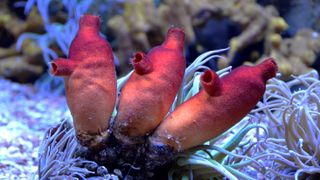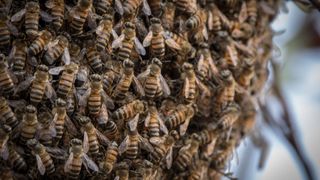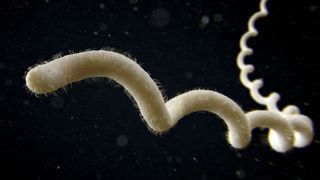
Sarah Moore
Sarah Moore is a freelance science writer. She has an MSc in neuroscience and a BSc in psychology from Goldsmiths College, University of London. Sarah has experience in academic research and has worked in medical communications with top pharmaceutical companies. As a freelancer, she has contributed work to a wide range of publications. Sarah loves to write on all areas of science, from healthcare to nanotechnology but she is especially intrigued by the workings of the human brain.
Latest articles by Sarah Moore

What happens to cancer cells when they die?
By Sarah Moore last updated
Cancer treatments aim to kill tumor cells, and the immune system is tasked with getting rid of the resulting cellular corpses.

How do screens damage your eyes?
By Sarah Moore published
Spending too much time in front of screens can elongate your eyes and increase the risk of other eye conditions down the line.

Half-billion-year-old fossil of strange Cambrian creature gives evolutionary clues about vertebrates
By Sarah Moore published
The fossil of an ancient sea squirt found in a collection at the Utah Museum of Natural History turned out to be the oldest of its kind.

Maternal death rates doubled in the past 20 years in the US
By Sarah Moore published
Maternal mortality rates in the U.S. progressively worsened from 1999 to 2019, a new study finds, and Black populations face the greatest risk.

Controversial 'vaginal seeding' shows promise in small trial, but questions remain
By Sarah Moore published
"Vaginal seeding" may help restore the gut microbiome of cesarean-born babies, a small trial suggests. However, the practice isn't currently recommended by leading experts and previous studies have warned of its potential safety risks.

Elon Musk's Neuralink 'brain chips' cleared for 1st in-human trials
By Sarah Moore published
Brain implants developed by Elon Musk's company Neuralink have been approved for human testing. The safety of the devices previously came under scrutiny following reports of "botched surgeries" in animal test subjects.

Killer bees stung a man 250 times in swarm attack, but he survived. How?
By Sarah Moore published
A man escaped death after being stung by a swarm of 1,000 killer bees, yet previous similar incidents have proved fatal. Why do some people survive and others don't?

'Brain-eating' amoeba ruled out in 'cluster of illnesses' in Oklahoma. What could the cause be?
By Sarah Moore published
Oklahoma's state health department is investigating a cluster of illnesses in people who swam in local lakes and rivers. The cause remains unknown, but a dangerous brain-eating amoeba has been ruled out.
Get the world’s most fascinating discoveries delivered straight to your inbox.


